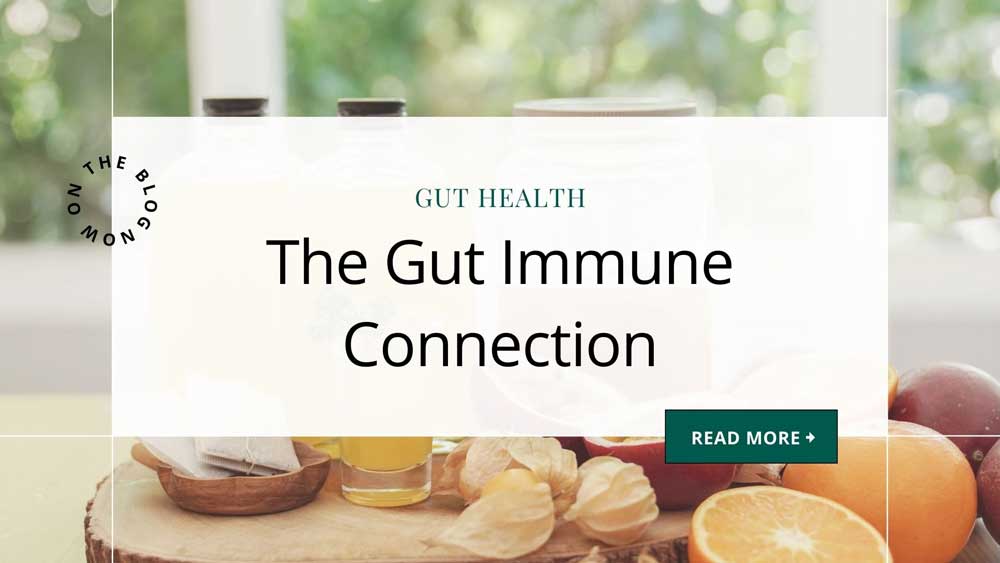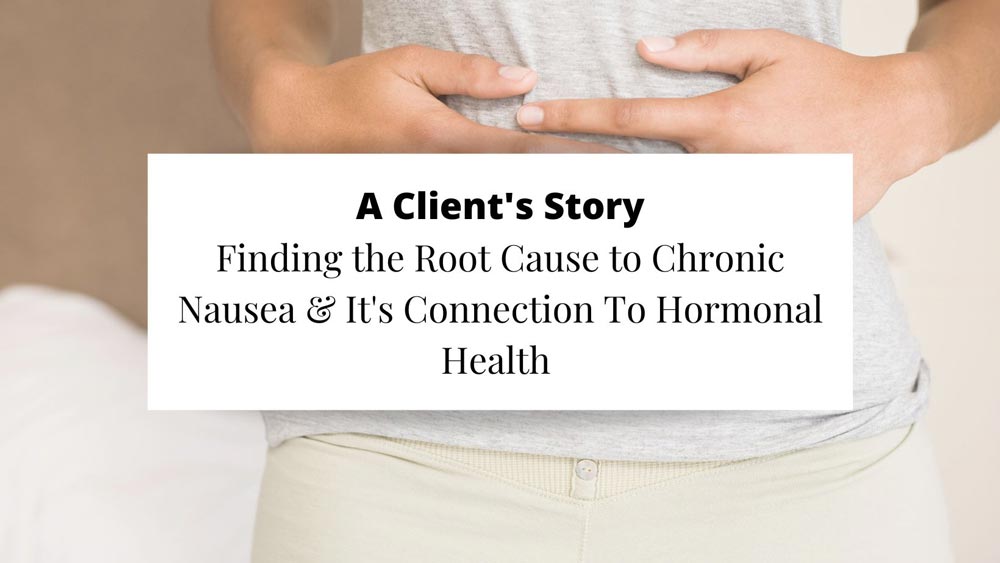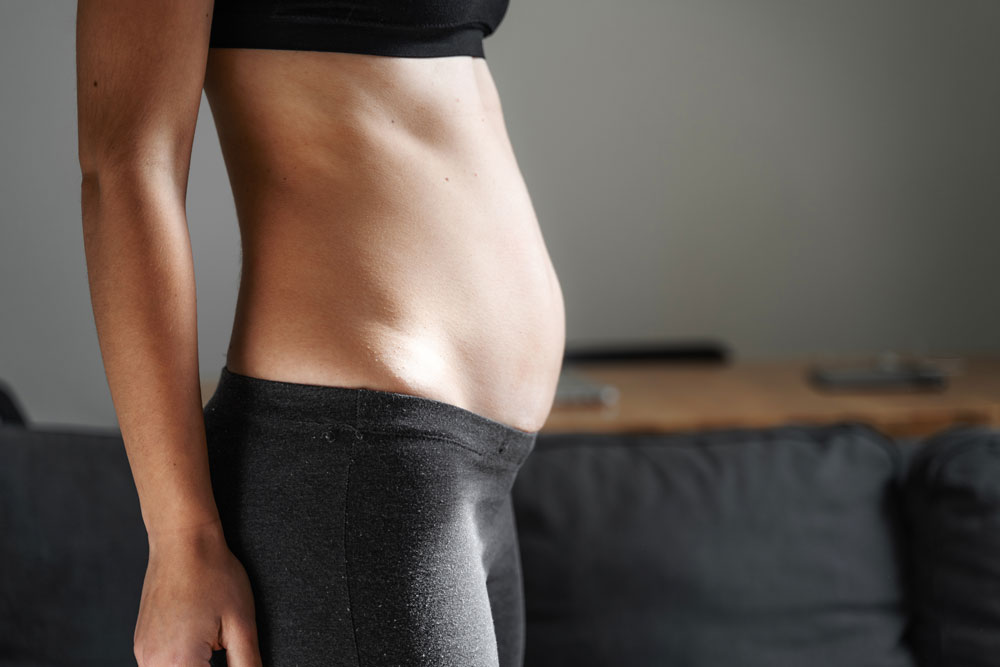An occasional bloated stomach after eating is normal in a high percentage of the population.
Knowing it’s common does not make bloating after eating any more comfortable.
Bloating can be especially frustrating if you’re eating out socially, or finding that your bloat is starting to affect the way you feel at work.
Incorporating these ten tips into your lifestyle can help to minimise bloating so that you can get on with your day without that uncomfortable full, stretching feeling.
Ten Tips to Avoid a Bloated Stomach After Eating
1. Don’t rush when you are eating and chew your food properly
If you are eating in a rush or focused on something else while you are eating, it can cause you to swallow more air.
This can cause distension in the stomach and small intestine.
Rushing while you are eating can also impair your digestion. This is because you are less focused on chewing your food thoroughly which at the end of the day is the first phase of digestion. Swallowing larger chunks of food can impair digestion in your stomach and small intestine, leading to reflux, burping and bloating.
Instead be mindful while you are eating, focusing on the texture and flavours of your food to slow down and ensure you are chewing thoroughly before swallowing.
2. Avoid over eating
Eating too fast can also lead to over eating which can lead to a bloated stomach after eating. This is because the signal from your stomach to your brain to tell you that you are full takes approximately 20 minutes.
If you’re eating too fast you may actually eat more than your stomach feels comfortable digesting at any given time. This can lead to a feeling of extreme fullness, indigestion and bloating.
It’s important to feel satisfied after your main meal, but to avoid feeling overly stuffed and bloated, take your time to eat and give yourself at least 20 minutes to eat your main meal before you look for more food or going for seconds.
3. Chew on Fennel Seeds
Fennel is a renowned herbal carminative that means to ease the digestive system of symptoms such as pain, cramping, bloating and gas. It aids to relax the smooth muscle in the small intestine and colon by stimulating the sympathetic nervous system which is the ‘rest and digest’ phase.
It’s particularly beneficial for easing these digestive symptoms such as bloating after eating.
How to use it: Simply chew on a half a teaspoon of fennel seeds after eating and swallow.
4. Try Iberogast Drops
Iberogast is a ready made herbal formula which has been clinically trialled to aid symptoms associated with irritable bowel syndrome such as bloating.
It contains the following herbs which have been shown to alleviate a number of gastrointestinal symptoms such as bloating, gas, reflux, abdominal pain and spasms.
- Bitter Candytuff
- Angelica
- Chamomile
- Caraway
- St Mary’s Thistle
- Lemon Balm
- Peppermint
- Greater Celandine
- Liquorice
How to take it: Take 20-30 drops 2-3 times daily in warm water before main meals.
5. Drink Chamomile Tea
To avoid a bloated stomach after eating, drinking chamomile tea is another gentle herb that can be tried.
Chamomile helps to educe painful bloating by relaxing the digestive system. This herb is particularly good for stress induced digestive symptoms, as it also relaxes the nervous system and calms the mind reducing the negative impact of stress on your gut.
It provides natural anti-inflammatory properties, soothing the digestive lining and reducing pain and bloating.
How to drink it: Steep your chamomile tea bag for 10 minutes in boiling water, followed by squeezing the tea bag out before drinking. Drink up to three cups a day after food to enjoy the benefits of a relaxing nervous system and settling that painful bloating.
6. Take vegetarian digestive enzymes
Taking digestive enzymes that contain ingredients such as amylase, protease, lactase, cellulase and lipase can aid the digestion and breakdown of your food to help avoid a bloated stomach after eating.
Vegetarian digestive enzymes can help to break down carbohydrates, fibre, protein and fat in your meal, reducing that heavy bloated feeling.
How to take it: Using 1-3 capsules with each meal depending on the formulation chosen. Follow the directions on the back of the bottle.
7. No to carbonated drinks
Drinking carbonated beverages such as soda water or soft drink increases the amount of air that you are digesting which can lead to a bloated stomach soon after eating.
Instead stick with plain water or drinking after your food has digested.
8. Walk after eating
Walking after a meal can help to reduce bloating by helping to remove gas from the digestive tract, alleviating trapped gas that leads to bloating.
9. Avoid wearing tight pants
Wearing tight pants after eating such as bike shorts, gym pants, high waisted skirts or trousers that sits on your stomach or digestive system could cause bloating after eating.
Instead opt for a loose fitting dress, a longer top or pants/skirt that can sit lower over your hips instead of your waist.
10. Minimise highly fermentable carbohydrates
Certain plant based carbohydrates found in fruits, vegetables, legumes and grains can increase gas production which leads to bloating soon after eating.
If there is abnormal fermentation occurring in your small or large intestine due to a microbial imbalance, minimising these carbohydrates may be beneficial.
Examples include:
- Apple
- Cabbage
- Broccoli
- Brussel sprouts
- Garlic
- Onion
- Beans
- Lentils
- Wheat bread
What causes a bloated stomach after eating?
If you’re experiencing a bloated stomach after eating more than occasionally, there could be other factors at play that need to be addressed. Finding the root cause is important to overcome long term bloating for good.
In clinic and in the literature, the most common cause to abdominal bloating is intestinal gas production in the small and/or large intestine. (1)
There can be one or multiple factors that increase intestinal gas, from constipation to endometriosis. Locating the root cause can help your gut health in the long term, it’s important not to ignore it.
Blog Posts You May Like

The Gut-Immune Connection: How Secretory IgA Plays a Vital Role
As a practitioner who has been using stool testing for the last five years. I have developed a keen interest in Faecal Secretory IgA (SIgA) and its significance in understanding the gut terrain. Particularly it's relationship to food allergies, sensitivities and...

A Clients Story – Finding the Root Cause to Chronic Nausea & Period Pain
"My health journey began in 2002 after contracting gastro from my partner at the time. After being violently ill for about 10 hours it took about 5 days before I could eat again and before I felt "ok" again. I never truly felt like myself or "normal" after that. The...

Abdominal Bloating – Causes & Simple Natural Strategies
Abdominal bloating causes can range anywhere from constipation to a medically diagnosed condition called endometriosis. There can be one or multiple factors causing your abdominal bloating. At the end of the article I also share some simple strategies you can start...


